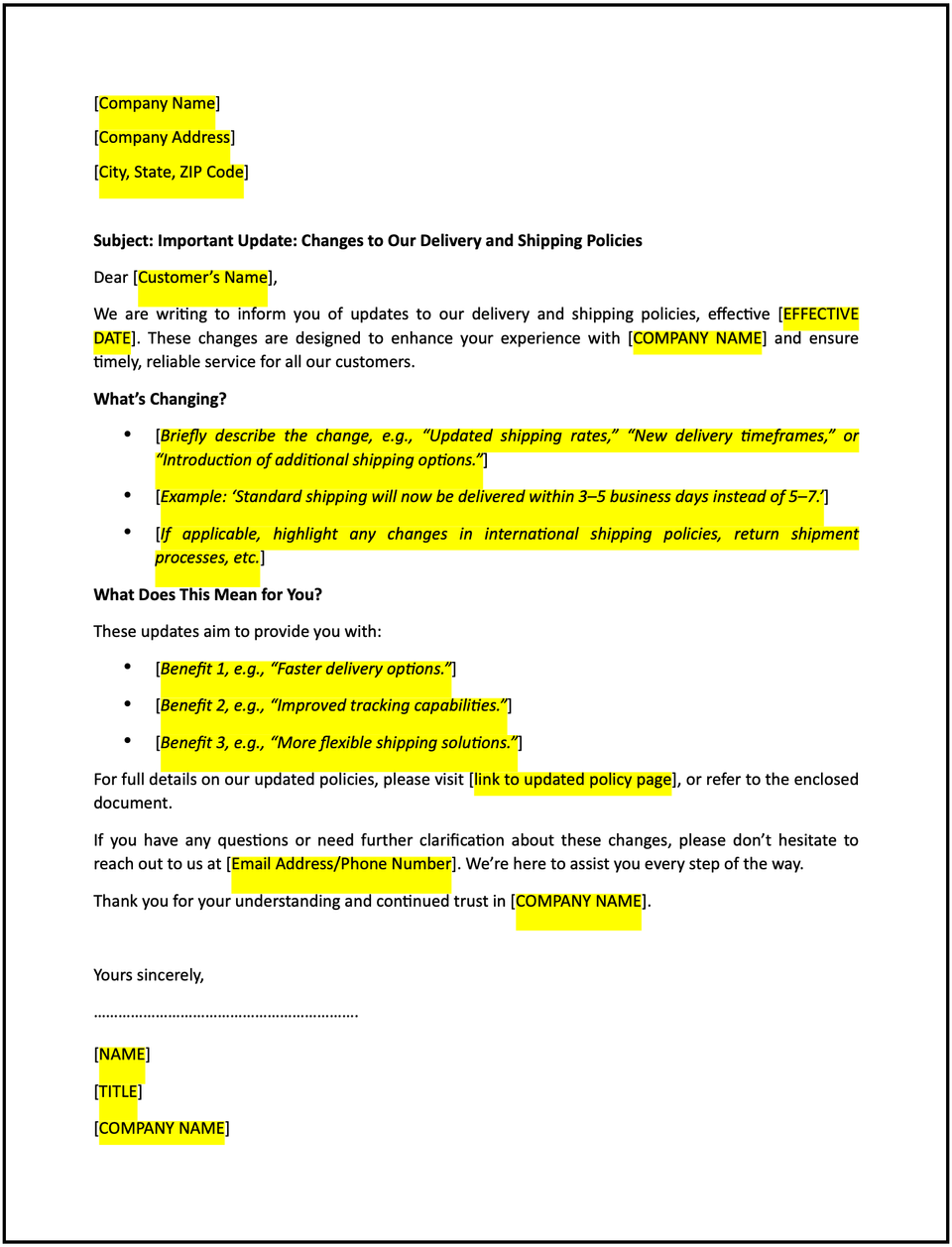Letter of changes to delivery or shipping policies: Free template

Letter of changes to delivery or shipping policies
Communicating changes to delivery or shipping policies is crucial for maintaining transparency and trust with customers. This letter provides a professional way to inform customers of the updates, explain the rationale behind the changes, and address any concerns.
How to use this letter of changes to delivery or shipping policies
- Open with appreciation: Start by thanking the customer for their ongoing support and engagement.
- Announce the changes: Clearly state the changes to the delivery or shipping policies, including the specific updates and their effective date.
- Explain the rationale: Briefly outline the reasons for the changes, such as improving service, adapting to market conditions, or enhancing customer experience.
- Highlight the impact: Explain how the changes may affect the customer, emphasizing any benefits or improvements they can expect.
- Offer assistance: Provide details on how customers can get support or clarification regarding the updated policies.
- Maintain a professional tone: Ensure the letter is respectful, clear, and customer-focused.
- Invite feedback: Encourage the customer to share any questions or concerns about the changes.
Benefits of using a letter of changes to delivery or shipping policies
This letter template ensures a structured and professional way to communicate policy changes while maintaining transparency and fostering trust. Here’s how it helps:
- Promotes transparency: Clearly communicating the changes builds trust and demonstrates accountability.
- Reduces confusion: Providing specific details ensures customers understand the updated policies.
- Enhances professionalism: A well-crafted communication reflects positively on your brand.
- Addresses customer concerns: Offering assistance reassures customers and prevents misunderstandings.
- Strengthens relationships: Proactive communication fosters loyalty and confidence in your service.
Tips for writing an effective letter of changes to delivery or shipping policies
- Be specific: Clearly outline the changes, including dates, costs, or processes that are being updated.
- Use professional language: Maintain a respectful and clear tone to ensure customers feel informed and valued.
- Highlight customer benefits: Emphasize how the changes improve service or enhance their experience.
- Provide clear instructions: If the changes require customer action, ensure the steps are straightforward and easy to follow.
- Keep it concise: Focus on the key points and avoid overwhelming the customer with unnecessary details.
Frequently asked questions (FAQs)
Q: What details should I include in this letter?
A: Include a summary of the changes, the effective date, the rationale for the updates, and any steps customers need to take.
Q: Should I personalize the letter?
A: While not always necessary, addressing the customer by name can add a personal touch and foster engagement.
Q: Who typically receives this letter?
A: Send the letter to all affected customers or stakeholders who rely on your delivery or shipping services.
Q: How formal should this letter be?
A: The tone should be professional yet approachable to maintain a positive relationship.
Q: When should this letter be sent?
A: Send the letter well in advance of the policy changes to give customers ample time to adjust.
Q: Can this letter include promotional offers?
A: Yes, including a promotional offer related to the updated policies can soften the impact of changes and encourage customer retention.
Q: Is acknowledgment from the customer required?
A: While not required, providing contact information for questions or feedback ensures clarity and support.
This article contains general legal information and does not contain legal advice. Cobrief is not a law firm or a substitute for an attorney or law firm. The law is complex and changes often. For legal advice, please ask a lawyer.


